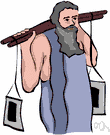peasant
Also found in: Thesaurus, Encyclopedia, Wikipedia.
peas·ant
(pĕz′ənt)n.
1. A member of a class of small farmers and farm laborers, especially in a preindustrial or underdeveloped society.
2. A person who lives in a rural area; a rustic.
3. A person who is considered crude or uncouth; a boor.
[Middle English paissaunt, from Old French paisant, from pais, country, from Late Latin pāgēnsis, inhabitant of a district, from Latin pāgus, district; see pag- in Indo-European roots.]
American Heritage® Dictionary of the English Language, Fifth Edition. Copyright © 2016 by Houghton Mifflin Harcourt Publishing Company. Published by Houghton Mifflin Harcourt Publishing Company. All rights reserved.
peasant
(ˈpɛzənt)n
1. (Sociology)
a. a member of a class of low social status that depends on either cottage industry or agricultural labour as a means of subsistence
b. (as modifier): peasant dress.
2. informal a person who lives in the country; rustic
3. informal an uncouth or uncultured person
[C15: from Anglo-French, from Old French païsant, from païs country, from Latin pāgus rural area; see pagan]
Collins English Dictionary – Complete and Unabridged, 12th Edition 2014 © HarperCollins Publishers 1991, 1994, 1998, 2000, 2003, 2006, 2007, 2009, 2011, 2014
peas•ant
(ˈpɛz ənt)n.
1. a member of a class of small farmers or farm laborers of low social rank, as in Europe, Asia, or Latin America.
2. a coarse, uneducated person.
adj. 3. of or characteristic of peasants or their way of life.
4. modeled on the folk costumes of Western cultures: peasant blouses.
[1375–1425; late Middle English paissaunt < Anglo-French paisant, Old French païsant, earlier païsenc=païs country (< Late Latin pāgēnsis= Latin pāg(us) country district + -ēnsis -ensis) + -enc < Germanic]
Random House Kernerman Webster's College Dictionary, © 2010 K Dictionaries Ltd. Copyright 2005, 1997, 1991 by Random House, Inc. All rights reserved.
ThesaurusAntonymsRelated WordsSynonymsLegend:
Switch to new thesaurus
| Noun | 1. |  peasant - a country person peasant - a country person rustic - an unsophisticated country person |
| 2. | peasant - one of a (chiefly European) class of agricultural laborers peasantry - the class of peasants agricultural laborer, agricultural labourer - a person who tills the soil for a living fellah - an agricultural laborer in Arab countries | |
| 3. |  peasant - a crude uncouth ill-bred person lacking culture or refinement peasant - a crude uncouth ill-bred person lacking culture or refinementdisagreeable person, unpleasant person - a person who is not pleasant or agreeable |
Based on WordNet 3.0, Farlex clipart collection. © 2003-2012 Princeton University, Farlex Inc.
peasant
noun
1. rustic, countryman, hind (obsolete), swain (archaic), son of the soil, churl (archaic) land given to peasants for food production
2. (Informal) boor, provincial, hick (informal, chiefly U.S. & Canad.), lout, yokel, country bumpkin, hayseed (U.S. & Canad. informal), churl Why should I let a lot of peasants traipse over my property?
Collins Thesaurus of the English Language – Complete and Unabridged 2nd Edition. 2002 © HarperCollins Publishers 1995, 2002
Translations
فَلاّح
-kavenkovan
bondebonde-
maalainenmoukkatalonpoika
seljakseljanka
paraszt
smábóndi, sveitamaîur
valstietijavalstietis
zemnieks
roľník
kmet
köylürençber
peasant
[ˈpezənt]A. N → campesino/a m/f (pej) → palurdo/a m/f
a peasant revolt → un levantamiento campesino or del campesinado
a peasant revolt → un levantamiento campesino or del campesinado
Collins Spanish Dictionary - Complete and Unabridged 8th Edition 2005 © William Collins Sons & Co. Ltd. 1971, 1988 © HarperCollins Publishers 1992, 1993, 1996, 1997, 2000, 2003, 2005
peasant
[ˈpɛzənt] n → paysan(ne) m/fpea soup n (from green peas) → soupe f aux pois; (from split peas) → soupe f aux pois cassésCollins English/French Electronic Resource. © HarperCollins Publishers 2005
peasant
n (lit) → (armer) Bauer, (arme) Bäuerin; (pej inf) (= ignoramus) → Banause m, → Banausin f; (= lout) → Bauer m; (= pleb) → Prolet(in) m(f)
adj attr → bäuerlich; peasant boy/girl → Bauernjunge m → /-mädchen nt; peasant farmer → (armer) Bauer; peasant labour → Landarbeiterschaft f, → landwirtschaftliche Arbeitskräfte pl; peasant leader → Bauernführer(in) m(f); peasant unrest → Bauernunruhen pl; peasant woman → (arme) Bäuerin; to be from peasant stock → von bäuerlicher Herkunft sein
Collins German Dictionary – Complete and Unabridged 7th Edition 2005. © William Collins Sons & Co. Ltd. 1980 © HarperCollins Publishers 1991, 1997, 1999, 2004, 2005, 2007
peasant
[ˈpɛz/ənt]1. n → contadino/a
Collins Italian Dictionary 1st Edition © HarperCollins Publishers 1995
peasant
(ˈpeznt) noun a person who lives and works on the land, especially in a poor, primitive or underdeveloped area. Many peasants died during the drought; (also adjective) a peasant farmer.
ˈpeasantry noun peasants as a group; the peasants of a particular place. What part did the peasantry play in the Russian revolution?
Kernerman English Multilingual Dictionary © 2006-2013 K Dictionaries Ltd.